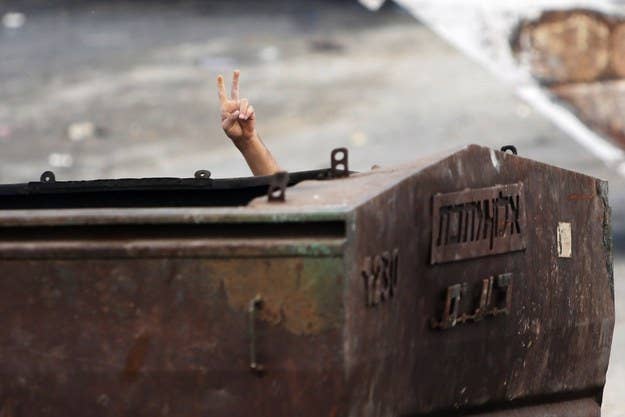
JERUSALEM – In the course of a single hour, Muhammed Jameel changes his mind three times over whether he, and other Palestinian youths, are at the start of a new intifada.
"It's the third intifada, and this one will burn until all of Jerusalem is consumed!" said Jameel, 23, to a crowd of European and American journalists, who gathered Thursday in East Jerusalem's Silwan neighborhood to watch clashes between rock-throwing Palestinian youths and Israeli police. But just minutes later, as journalists dispersed to chase down the latest volley of tear gas, Jameel had reconsidered.
"It's not really the intifada yet, but it strengthens us to call it that," he said. "I mean we think this could be the next intifada soon."
Over the last week, excited headlines have declared the violence in Jerusalem the start of the third intifada, or Palestinian uprising. Similar headlines sounded throughout the summer, as protests and then riots engulfed Jerusalem over the deaths of three Israeli teens and the revenge killing of a Palestinian youth.
"Everyone is trying to race each other to be the first to declare an intifada," said Hussein Abu Maloof, a Palestinian shopkeeper in East Jerusalem. "I think you journalists think you get a prize for being first."
There is no doubt that the last few months in Jerusalem have been tense. The nearly two-month war that raged between Israel and the Gaza Strip over the summer was punctuating by riots in East Jerusalem that went largely unreported as the region's attention focused elsewhere. In the months since the war ended, sporadic violence has broken out as settlers created their largest-presence to-date in the largely-Palestinian neighborhood of Silwan. Palestinians say they are being systematically forced out of their historic neighborhoods, Jewish Israelis say they have a right to live in all parts of historic Jerusalem.
U.S. State Department officials have condemned the movement of settlers into East Jerusalem, saying such steps make it "harder to achieve peace." Israeli Prime Minister Netanyahu has condemned the American condemnations, in yet another spat that has led to the current low-point in U.S.-Israeli ties.
On Wednesday night, the American-born right-wing Israeli activist Yehuda Glick was shot as he left a speaking engagement in Jerusalem's Begin Center. The location of the Center, on the fault line between the largely Jewish West and the largely Palestinian East was symbolic for many. The two simmering halves of the city were destined to erupt, said Sarah Wilderman, a mother of four who lives just a few minutes from where Glick was shot.
"What did anyone expect? I'm surprised this didn't happen sooner. When will people wake up and realize that we are already living under an intifada here?" said Wilderman, who wants Israeli police to seal off East Jerusalem, and ban Palestinian from entering other parts of the city. "It's only a matter of time until they kill someone else."
Glick, who is still in the hospital, was one of the leaders of the Temple Mount Institute, a group dedicated to rebuilding the Temple Mount on the site where the Al-Aqsa Mosque compound currently sites. The area, which is considered sacred by both Muslims and Jews, is among the most contentious in all of Jerusalem. In 2000, former Israeli Prime Minister Ariel Sharon was widely-seen as sparking the second intifada when he paid a very public visit to the area.
In videos such as these, Glick and his group argued that Jews should be allowed to pray at the Temple Mount, and rebuild the Temple there.
View this video on YouTube
Many said Glick had foreseen an attack. In an interview with Haaretz last week, Glick said that a change in the Al Aqsa Mosque Compound, or Temple Mount, would only take place, "As soon as the Arabs harm someone on the Temple Mount, the prime minister will wake up and it will be too late."
While Glick was not shot on the Temple Mount, he had just finished delivering a speech on it, and police say that his shooter Moataz Hejazi, 32, clarified and asked who he was before opening fire.
"He [Heajzi] did this because like the rest of us he was frustrated, he was angry that our lives keep getting worse and worse," said Jameel, who like many in Silwan said he "knew of" Hejazi, but did not know him well.
He said that he considered Glick an "appropriate target" because he was part of the settler movement.
"We have problems with people who have problems with us," said Jameel. "Everyone is angry because we feel a need defend our homes. We feel under attack. This is how the other intifadas began."
But unlike in previous years, Palestinians say they lack the political leadership that drove and gave direction to their protests. Palestinian Authority Chairman Mahmoud Abbas is trusted by few in the West Bank, and none in East Jerusalem, who argue that he doesn't represent their interests.
"He can barely do anything in Ramallah, which has his headquarters. Why would he ever be able to do anything in Jerusalem?" asked Muhammed Khabir, 37, a teacher in Silwan. "An intifada needs a leader, and we don't have one."
He spoke of the ongoing fighting between Fatah, in the West Bank, and Hamas, which controls the Gaza Strip as "exhausting for Palestinians, they fight and no one wins."
"We need someone fresh, and uncorrupted. We don't have that person to inspire an uprising," said Khabir.

